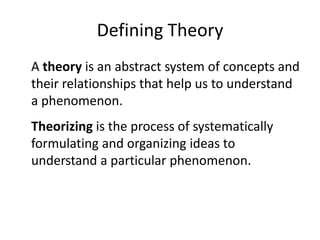Theory and Research
•Download as PPTX, PDF•
12 likes•13,382 views
Report
Share
Report
Share

Recommended
Presentation on types of research

Presentation on types of researchResearch Scholar - HNB Garhwal Central University, Srinagar, Uttarakhand.
More Related Content
What's hot
Presentation on types of research

Presentation on types of researchResearch Scholar - HNB Garhwal Central University, Srinagar, Uttarakhand.
What's hot (20)
Inductive and Deductive Approach to Research. Difference between Inductive an...

Inductive and Deductive Approach to Research. Difference between Inductive an...
Similar to Theory and Research
Similar to Theory and Research (20)
Slide 1 what is social science social science is about examinin

Slide 1 what is social science social science is about examinin
D821 beliefs and evidence presentation 2010 Martin Le Voi and Eileen Mansfield

D821 beliefs and evidence presentation 2010 Martin Le Voi and Eileen Mansfield
Describe the experimental, observational, survey, and case study met.pdf

Describe the experimental, observational, survey, and case study met.pdf
Chapter 2 Social Sciences Andthe Scientific Method

Chapter 2 Social Sciences Andthe Scientific Method
More from Brigham Young University
More from Brigham Young University (20)
Recently uploaded
Recently uploaded (20)
Essential Safety precautions during monsoon season

Essential Safety precautions during monsoon season
ppt your views.ppt your views of your college in your eyes

ppt your views.ppt your views of your college in your eyes
Incoming and Outgoing Shipments in 2 STEPS Using Odoo 17

Incoming and Outgoing Shipments in 2 STEPS Using Odoo 17
Removal Strategy _ FEFO _ Working with Perishable Products in Odoo 17

Removal Strategy _ FEFO _ Working with Perishable Products in Odoo 17
Matatag-Curriculum and the 21st Century Skills Presentation.pptx

Matatag-Curriculum and the 21st Century Skills Presentation.pptx
The Benefits and Challenges of Open Educational Resources

The Benefits and Challenges of Open Educational Resources
UNIT – IV_PCI Complaints: Complaints and evaluation of complaints, Handling o...

UNIT – IV_PCI Complaints: Complaints and evaluation of complaints, Handling o...
Application of Matrices in real life. Presentation on application of matrices

Application of Matrices in real life. Presentation on application of matrices
Theory and Research
- 1. Defining Theory A theory is an abstract system of concepts and their relationships that help us to understand a phenomenon. Theorizing is the process of systematically formulating and organizing ideas to understand a particular phenomenon.
- 2. Three Features of Theories Level of generality Grand Mid-range Narrow Components Concepts: Elements of the theory Nominal / real Relationships: How concepts are connected Linear / interactive / transactional
- 3. Three Features of Theories Goals Explanation Understanding Prediction Social change
- 4. Approaches to Knowing How one sees and talks about the world influences how and what one chooses to research Three major approaches to knowing Positivist/empirical Interpretive Critical
- 5. Positivist/Empirical Approach Objective truths can be uncovered about human interactions Research processes can be partially value-neutral Natural scientific methods, with control over the variables Goal is to construct general laws governing human interactions “Theory-then-research”
- 6. Interpretive Approach Truth is subjective and co-created by the participants in the research process Complete objectivity is often impossible The study of interaction is believed to be value-relevant, so researchers should “monitor assumptions and inferences” No concern for control or generalizeability; focus is providing rich descriptions “Research-then-theory”
- 7. Critical Approach Those in power shape knowledge in ways that perpetuate the status quo Researchers seek to change the status quo to resolve power imbalances and give voice to the silenced These imbalances are often reproduced accidentally through social norms
- 8. Approaches to Knowing The types of questions one asks about the world influence how and what one chooses to research Three major types of questions Ontological Epistemological Axiological
- 9. Ontology The study of being/nonbeing, or the nature of reality The three approaches’ views on ontology Empirical: General laws govern human interactions and free choice is limited Interpretive: People have free choice and the researcher’s job is to co-create reality Critical: There is choice and constraint in the power structures they wish to change
- 10. Epistemology How we go about knowing and what counts as knowledge The three approaches’ views on epistemology Empirical: Strive for control over research process and rely on statistical tests Interpretive: Rely on their own and their participants’ explanations/interpretations Critical: Focus on power imbalances
- 11. Axiology The role of values in theory and research The three approaches’ views on axiology Empirical: Avoid allowing values to influence the research process as much as possible Interpretive: Recognize that values unavoidably influence the entire process Critical: Values should be closely intertwined with scholarly work
- 12. Approaches to Knowing The answers to the preceding questions influence how one goes about building theory Three major approaches to theory-building Covering law Rules Systems
- 13. The Covering Law Approach Seeks to explain an event by referring to a general law Believes communication behavior is fixed and generalizeable May specify various types of relationships Can hypothesize and test but never fully confirm such theories In communication, researchers strive for probabilistic laws or “law-like” predictions
- 14. The Rules Approach People engage in intentional, goal-directed behavior Although we may be restricted by rules and other constraints, human behavior is viewed as a result of free choice Researchers investigate the rules that govern actions in a particular community Habitual Rules Parametric Rules Tactical Rules
- 15. The Systems Approach Free will is constrained by the system in which people operate Derived from General Systems Theory Changes the focus from the individual (part) to the group (whole) Agrees with rules perspective assertion that communication behavior is not characterized by universal patterns
- 16. The Research Process Two types of research Pure: Researchers are guided by knowledge-generating goals Applied: Researchers wish to solve specific problems with the knowledge generated These process are interrelated in a “practical” discipline like communication